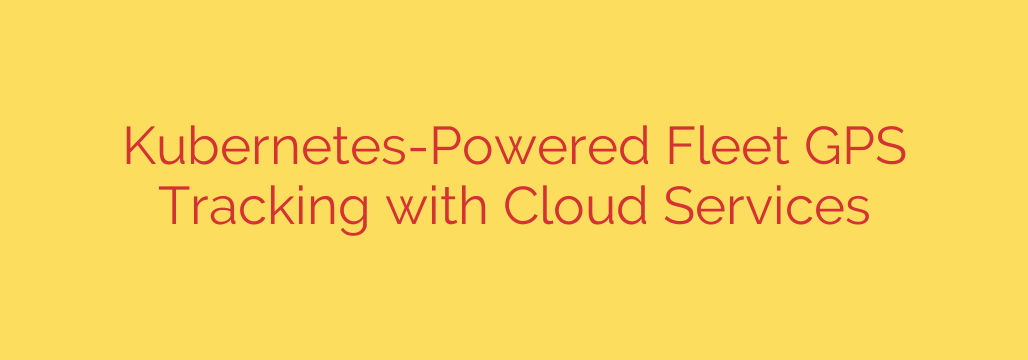
Building a Scalable GPS Fleet Tracking System with Kubernetes and Cloud Services
For any company managing a fleet of vehicles—whether for logistics, delivery, or field services—real-time visibility is no longer a luxury; it’s a competitive necessity. While off-the-shelf GPS tracking solutions exist, they often come with rigid features, scaling limitations, and mounting subscription costs. A modern, powerful alternative is emerging: building a custom, cloud-native fleet tracking system powered by Kubernetes.
This approach combines the raw power of cloud infrastructure with the flexibility of container orchestration, delivering a solution that is scalable, resilient, and perfectly tailored to your business needs.
The Core Architecture: How It All Works
At its heart, a Kubernetes-based GPS tracking system is a sophisticated data pipeline. It’s designed to reliably ingest location data from thousands of moving vehicles, process it in real-time, and present it through an intuitive interface.
Here’s a breakdown of the essential components:
- Data Ingestion: Each vehicle is equipped with a GPS device that transmits data (latitude, longitude, speed, timestamp) at regular intervals. This data is sent to a cloud endpoint, typically through a lightweight protocol like MQTT or a secure HTTP API.
- Containerized Processing: This is where Kubernetes shines. Incoming data is received by a set of services running in containers. Kubernetes acts as the master controller, automatically managing these containers. If traffic spikes, Kubernetes instantly scales up the number of containers to handle the load. If a container fails, Kubernetes automatically replaces it, ensuring zero downtime.
- Data Storage and Analysis: The processed GPS data needs a home. A robust, cloud-based database is used for storage. For location-based data, a database like PostgreSQL with the PostGIS extension is an excellent choice, as it allows for complex geographic queries (e.g., “find all vehicles within this geofenced area”).
- API and Frontend: A secure API layer exposes the processed data to your applications. This could be a web-based dashboard for your dispatch team, a mobile app for managers, or an analytics platform for business intelligence.
Key Benefits of a Kubernetes-Powered Approach
Choosing to build your fleet management platform with Kubernetes and cloud services unlocks several significant advantages over traditional systems.
- Unmatched Scalability: Whether you are tracking 10 vehicles or 10,000, the system can scale seamlessly. Kubernetes and cloud infrastructure allow you to add resources on demand, so you only pay for what you use. This eliminates performance bottlenecks as your fleet grows.
- Exceptional Reliability and High Availability: Business operations can’t afford downtime. Kubernetes is designed for resilience. Its self-healing capabilities mean that if a server or application component fails, the system automatically recovers without manual intervention. This ensures your tracking data is always flowing.
- Ultimate Customization and Control: Off-the-shelf solutions force you into their ecosystem. By building your own platform, you have complete control. You can integrate with your existing business systems (like ERP or CRM), design custom alerts (e.g., for excessive idling or speeding), and generate reports that are specific to your KPIs.
- Long-Term Cost-Effectiveness: While there is an initial investment in development, the operational costs can be significantly lower than paying per-vehicle subscription fees. The efficient resource utilization provided by Kubernetes ensures you are not overprovisioning or paying for idle infrastructure.
Security Best Practices for Your Fleet Tracking System
Building a system that handles sensitive location data demands a security-first mindset. Protecting this data is not just a technical requirement but a business imperative.
Here are critical security measures you must implement:
- End-to-End Encryption: All communication, from the GPS device in the vehicle to your cloud servers, must be encrypted using strong TLS protocols. This prevents man-in-the-middle attacks.
- Secure API Endpoints: Your API is the gateway to your data. Implement robust authentication and authorization mechanisms like OAuth 2.0 or JWT (JSON Web Tokens) to ensure only verified users and services can access data.
- Kubernetes Network Policies: Use network policies within your Kubernetes cluster to strictly control traffic flow between services. This creates a zero-trust environment where components can only communicate with other components they are explicitly allowed to, limiting the blast radius of a potential breach.
- Data Encryption at Rest: The database storing your valuable location history must be encrypted. Most managed cloud databases offer this feature by default, providing a crucial layer of protection.
By leveraging the power of Kubernetes and cloud services, businesses can move beyond the limitations of generic software and build a truly strategic asset. A custom-built fleet tracking system provides the scalability, reliability, and deep integration needed to optimize operations, improve safety, and gain a decisive competitive edge in today’s fast-moving world.
Source: https://collabnix.com/fleet-gps-tracking-kubernetes-cloud-services/








